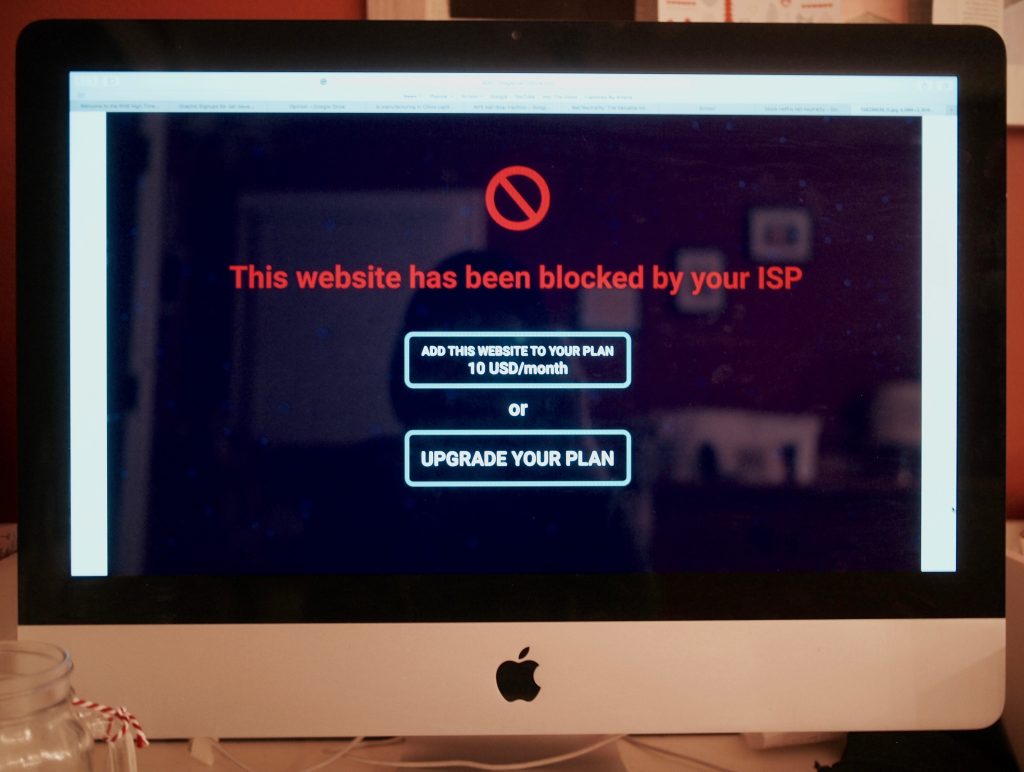You decide, after a long school day, that it is time to just relax and watch some Netflix. You open up your computer, sign in to your account, and open your internet browser. You type in the Netflix.com into the search bar, but you are not greeted by the Netflix homepage. Instead, there is a blank page with a message saying your internet provider has blocked access to the page unless you pay them for servicing the site. And it is not just Netflix, either. Other sites start giving you the same issue. This would be commonplace in a world where net neutrality is nonexistent.
Net neutrality may be an unknown term to the common internet user, and that is because people who use the internet do not really have to worry about being blocked from certain sites. Chances are, if you have got a computer and a solid internet connection, you can pretty much do whatever you would like on the internet. Net neutrality is just that; the principle of an open internet, where data must be equally available to everyone to do whatever they please. You may have heard this term mentioned in recent conversations or news broadcasts because the concept of net neutrality has been a highly-debated issue in the United States for the past few years now; and due to a recent vote, even more so this last month.
The question is relatively simple: should net neutrality be required by law? If so, internet providers would have to adhere to said law, and everyone, no matter his or her internet provider, would then be able to access the same data across the internet. If not, each internet provider, such as Verizon or Comcast, could choose the sites to which you would be allowed to go, and either throttle down the speeds or block the connection to the sites they choose to not service, unless you buy a certain service to gain access to those features.
From the internet providers’ perspective, the abolition of net neutrality means much more profit and revenue going to their pockets, and because of that, the Federal Communications Commission, (FCC), a governmental organization responsible for controlling forms of communication through the US media, has opted to oppose net neutrality in the pursuit to achieve the system of a “modern marketplace.” Republican members of the commission, including FCC chairman Ajit Pai, believe that ending net neutrality would encourage creation and greater investment of infrastructural improvements and innovation on the part of internet providers by giving them more flexibility with how they distribute their product. On the other hand, proponents of net neutrality believe that upholding it encourages economic growth, civic empowerment, and free speech. It all boils down to which side should benefit; if net neutrality is upheld, then consumers, entrepreneurs, workers, and startups will be able to benefit due to an unequivocable Internet. On other hand, if net neutrality is repealed, then internet providers will be able to charge more for more access – allowing them to gain much more profit without extra cost.
So far in 2017, plans have been set in place to reduce the amount of net neutrality currently practiced on the internet. Certain protections set in place by the Obama administration in 2015 are in the process of being removed, and on December 14, 2017, a FCC vote was held deciding the fate of net neutrality in the United States. The commission voted for repeal, going 3-2 along party lines. However, this does not mean that net neutrality is coming to a screeching halt, as it must get through Congress first to be passed; and throughout the process, appeals can still be made. Nonetheless, it’s a big step toward a less open Internet.
As a student at RHS and a content creator on YouTube, net neutrality is essential for my everyday life. To even have the thought of having a slower connection or being completely barred from a site altogether is simply frightening, as it not only inhibits the production of videos I release on YouTube, but it could also hinder my educational experience. Students and teachers at Ridgewood High School would have to adjust; some sites might not be as easily accessible anymore, and depending on one’s internet provider and plan, one teacher could have access to a site one of their students would be unable to reach.
This is not only an issue facing our school community, however. The vote and verdict on December 14 has attracted the attention the entire nation, and there are other debates across the world regarding internet freedom that are in progress alongside the US disputes. If Congress ends net neutrality in support of the FCC vote, we all may be living in a world of curated internet experiences and more payments to simply access Netflix; something that may seem ridiculous to us now. The revocation of net neutrality would pose a great risk to internet users across the world. We take the internet and net neutrality for granted because we are on the internet every single day. It has become a part of who we are, how we communicate, and how we learn: and to be stripped of those luxuries would forever change internet experiences for us all.
Luca Richman
staff writer
Graphic: Amelia Chen

